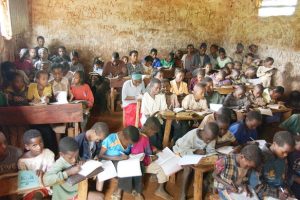
The African Leaders for Nutrition (ALN) initiative is a platform for high-level political engagement to advance nutrition in Africa. The initiative is part of eight flagship programs launched under the African Development Bank’s High 5 priorities, particularly “Feed Africa” and “Improve the quality of life for the people of Africa.” It is led by a group of ALN Champions, comprising current and former heads of state, finance ministers and eminent leaders with the power to catalyze and sustain high-level political leadership and commitment to end malnutrition in Africa.
According to the Ministry of Health report Ethiopia is committed to ending under nutrition in Ethiopia by 2030.
The ministry is working with local and international development partners tailoring various approaches that could let families know about feeding children under five. The report affirms that Ethiopia has made tremendous progress in achieving many of the Millennium Development Goals, including reducing poverty and child mortality. However, malnutrition remains high; the prevalence of stunting stands at 38 per cent and nearly one in four adult women suffer from anaemia. Through the National Nutrition Program (NNP II), the Food and Nutrition Policy (FNP) and the Seqota Declaration, the government is taking concrete steps to reduce the burden of malnutrition.
According to the Ministry the goal of ending under nutrition requires maximizing efforts through a synergistic approach that goes beyond incremental change and achieves transformative progress towards a prosperous nation. The government has mobilized an unprecedented multisectoral effort to coordinate federal and regional governments under the Woreda Transformation agenda.
The first milestone of the effort to integrate a range of initiatives under one plan and one budget, and the adoption of a system of collective oversight, is now in place. The plan encompasses: climate- and nutrition-smart investments and interventions; improving diets, water and sanitation at the household level; and ensuring sustainable agricultural production and practices.
Africa Head of States also discussed on ending malnutrition by 2025 at the African Union 33 summit in Addis Ababa, on the occasion pertinent stakes also par take on the event African Development Bank (AfDB) and Heads of state of Madagascar, Cote d’Ivoire and Sierra Leone, national ministers of health as well as African Development Bank (AfDB.org) President Akinwumi Adesina, head of the African Development Bank.
The participants had acknowledged the scope of the challenge but sounded a note of optimism. “We can conquer hunger in Africa,” said Madagascar’s President Andry Rajoelina, one of five African Leaders for Nutrition champions. “I call on all our partners to continue to work with us to address hunger and malnutrition.”Ivorian President Alassane Ouattara said leaders should take it a step further. “I have proposed for the AU to focus on tackling malnutrition as a theme for 2021,” he said.
Stunting has declined by eight percentage points across Africa since 2000, an advance on one of the UN’s 2025 targets. African countries have also shown strong progress toward achieving the target of 50 per cent of the world’s children being exclusively breastfed for the first six months of life. The other targets are: halting the epidemic of obesity; reducing anemia in women of reproductive age; reducing low birth weight and reducing wasting.
The ALN, a partnership of the African Union and African Development Bank, brings together heads of state, Finance Ministers and other leaders to raise awareness and accountability, and reinforce investment by African governments to end malnutrition among children.
ALN meeting, held this week in Addis Ababa on Saturday, offered an opportunity to take stock of achievements ahead of the Nutrition for Growth Summit to be held in Tokyo in December.
Adesina outlined initiatives by the Bank and African Union to reduce malnutrition, such as the Continental Nutrition Accountability Scorecard, which offers African leaders a snapshot of nutrition-related progress and gaps.
During his opening remarks, Adesina emphasized the paradox of African malnutrition. “We have 65 percent of the world’s remaining uncultivated arable land. We have an abundance of freshwater and about 300 days of sunshine a year. There’s no reason for anyone to go hungry,” the Bank chief said.
The meeting also offered recomendations for governments to strengthen African nutrition outcomes: promote a multi-sectoral approach; position nutrition within food systems; and spend more to combat malnutrition.
The Ethiopian Herald February 11/2020
BY MENGISTEAB TESHOME





